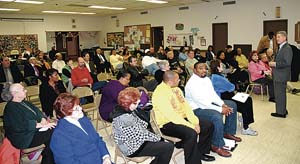
|
Dan Hust | Democrat
BOB FREEMAN, AT right, explains to the crowd the details of the public’s right to know and access to government information
|
State official answers questions about access to info, meetings
By Dan Hust
MONTICELLO — Thanks to the efforts of local citizens and Community Progressive Response (CPR), NYS Committee on Open Government Executive Director Bob Freeman paid a visit to Monticello last week.
And he provided more than an hour’s worth of valuable advice regarding the public’s right to know and access government information.
“I have what I have considered forever the best job in state government,” he related to a crowd of over 100 people. “... My only goal tonight is to give what I believe is the right answer.”
Thus he launched into a short explanation of the state’s Freedom of Information and Open Meetings laws, pointing people to the committee’s website (www.dos.state.ny.us/ coog/coogwww.html), where all of the committee’s 22,000 opinions can be read in their entirety.
Politicians, journalists and ordinary citizens have for years relied on Freeman and his staff of just three to guide them through the vagaries of state law as it pertains to access to information and gatherings.
And Monticello’s citizenry proved no exception. Some of the highlights from last week’s Q&A:
• Meeting minutes don’t need to be approved to be released to the public, said Freeman. They must be made available within two weeks of the meeting, but if the governing body has yet to approve the minutes, they can be marked “uncorrected,” “unapproved,” “draft,” etc.
• Anyone can tape-record or video-record public meetings, so long as they are not disruptive (a law that has its roots in a Sullivan County case).
• Letters delivered to a meeting with a request to be entered into the minutes do not have to be entered into the minutes.
• A board can limit how much of the public comment session is included in the minutes. In other words, not every word said by the public must be included in the official record.
• The public is not entitled to speak at a board meeting (as opposed to a public hearing). Public comment sessions are granted at the board’s discretion, though the law proscribes equal treatment of all people wishing to speak (i.e., if praise is allowed, so must criticism).
• A valid meeting cannot be held unless all the board members receive “reasonable” notice – though Freeman acknowledged that such a term can be difficult to define.
• No meetings can be conducted by phone unless a video image of all non-present board members is transmitted to the meeting’s location, which must be publicly accessible.
• According to Freeman, there is no law allowing an executive session simply to discuss “personnel” matters. Policy issues must be discussed in public. Otherwise, the law gives specific language to be used when holding a private meeting to discuss the employment of a particular person.
• The same concept applies to “legal” matters. While a board can enter into executive session to discuss a litigation strategy, it cannot do so simply to discuss the threat of litigation. And the public can request the board specifically identify the source and nature of the litigation.
• Freeman even touched on the rawness that has characterized Monticello politics of late.
“It seems to me that we have to respect each other even though we disagree,” he noted. “... We can’t, as individuals, win every battle. We have to compromise.”
Deb Mack, president of CPR, thanked Freeman for a presentation that seemed well-received by everyone.
“Let’s work together,” she urged the county and village politicians in attendance. “Let’s not close the public out.”



